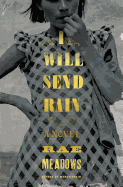
Rae Meadows's (Mercy Train) new historical novel sets timeless domestic issues against the hard times of the Dust Bowl. Themes of marital drift, infidelity, financial insecurity and the limiting of women's options make the past feel modern and create an easy kinship between the reader and Meadows's pitch-perfect characters.
The Bell family of Mulehead, Okla., wants what every Oklahoma farm family in 1934 wants: rain. Besieged by dust storms when "[t]he world had gone dark and haywire," steadfast, God-fearing farmer Samuel Bell worries that "Our land is on the wind." His wife, Annie, stares out at "Land as flat as a razor in every direction, a burned-out watery mirage," as they fret silently over how to provide for their children in the vicious drought of the Dust Bowl. The fault line in their marriage, already opened by the death of their second baby several years ago, yawns wider as both of them worry over the farm but keep their own counsel instead of turning to each other. Samuel wonders if Annie even needs him anymore, since "[i]t startled him sometimes how much she had become part of the land, shaped and scarred and bound by it," and if she regrets choosing a life with him over the seminary student her parents wanted her to marry back in Kansas. Annie is not as lost to him as he fears--"Today, though, standing next to him when she'd seen the clouds and, thinking they held rain, felt the tightness in her jaw ease, she had imagined again a carpet of wildflowers, trumpet vines, and pale green buffalo grass all around them, and she'd felt an old tenderness swelling. You and me and this family, she had wanted to say. She had offered her silent hand instead."
However, when the rain refuses to fall, she says nothing. When handsome Jack Lily, a Chicago native serving as town mayor, notices her, Annie feels "a tension between them both awful and delicious." The "barb of contempt" she feels toward Samuel lets her stray too easily into an emotional and physical affair. Samuel seeks refuge in religion, blind to his wife's transgressions as he takes on the task of building a boat, convinced his dreams of a mighty flood come from God.
The Bell children initially find the drought less affecting than their parents. Buoyed by the sense of invincibility inherent in the young, 15-year-old Birdie finds drama everywhere and falls head over heels for another farmer's son. Her younger brother, Fred, scans the horizon for storm clouds, not out of fear for the future, but because "Rain would mean wheat would mean money would mean a bicycle." Reality has no mercy for children, however. As neighbors pull up stakes and flee to California, Birdie learns the suitor she thought would take her away from the farm has left without her. Fred's asthma, thought at the time to be a psychosomatic disease, leaves him vulnerable to the dry and gritty conditions that bring on dust pneumonia.
Meadows includes all the honest folk, drifters and con-men needed for mid-'30s authenticity, together with plenty of historical detail, even "the overrun of rabbits, the plague-like nature of it." An early interlude in which a smooth talker from Amarillo proposes dynamiting the sky to bring on a storm both amuses the reader and brings home the desperation of people willing to try anything, believe anything, to salvage their lives. Yet, while the Bells scrape by on next to nothing, like their neighbors, Meadows concerns herself less with their meager physical resources and more with the struggles of their inner lives. The story draws its strength from complicated, hard-edged Annie, who rejected her mother's narrow path as a preacher's wife but has too much experience of the world to countenance her daughter's headstrong determination to wrestle life into the shape she desires. Her arguments with Birdie are the eternal miscommunication between parent and adolescent, the mother's attempts to provide a warning about the nature of life misconstrued by the teen as a bid for authoritarian control. To Birdie, the world seems full of possibilities, her mother a jailer bent on holding her back. To Annie, the need to convince Birdie to safeguard against an indiscretion that could limit her choices goes along with her own remembrance of struggling against her mother's attempts to shoehorn her into a preordained life. The parallel she draws between her own marital unhappiness and infidelity and her counsel to Birdie is not one of hypocrisy, but of cause and effect--if Birdie makes mistakes, the limited scope of a woman's freedom could someday place her in Annie's situation, or worse. Meadows's clear but subtle distinctions in how Annie approaches her decisions gives the reader ample room to empathize with her choices, even when they might hurt her family.
In the midst of exploring women's issues and how much damage a marriage can take before it buckles, Meadows always takes time to indulge in prose more lush than one might expect given the setting, such as when Annie "remembered dew sliding down blades of buffalo grass and collecting in honeysuckle flowers and slippery under bare feet before dawn. Mornings like a juicy pear." Alternately delicate and elegiac, glowing and ferocious, this slow dance through the devastation of history leaves readers with a glimpse of the cost to those who stayed to brave the hard times. --Jaclyn Fulwood

